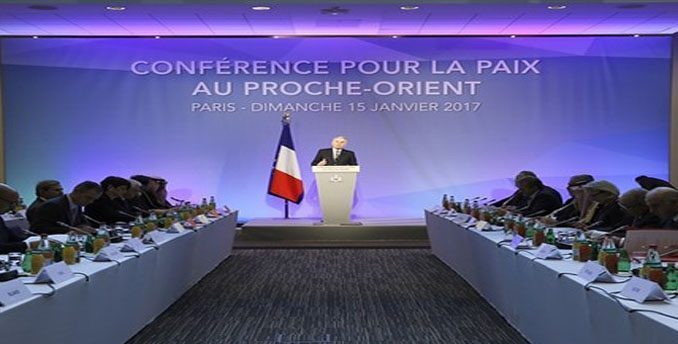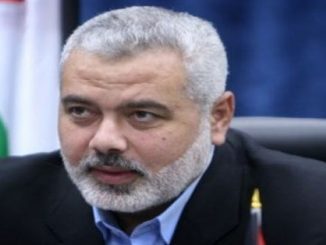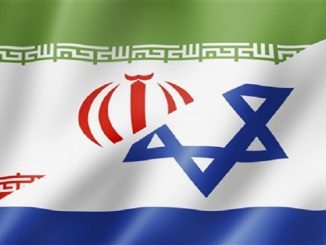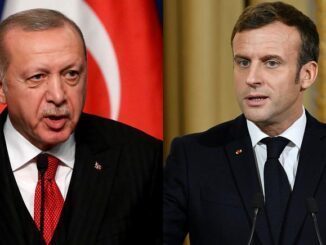
Palestinian and foreign officials had mixed reactions following a summit held in Paris on Sunday, with some expressing doubt at the likelihood that a new round of international negotiations would help reach a resolution to the Israeli-Palestinian conflict.
Palestinian President Mahmoud Abbas thanked the French government as well as all countries which participated in the summit, saying that the conference confirmed the international commitment to a two-state solution and the rejection of Israel’s illegal settlement activity in the occupied Palestinian territory.
Abbas reiterated his support of UN Security Council Resolution 2334 regarding Israeli settlements and the necessity to apply it in order to preserve the possibility of a two-state solution, and called on all countries which haven’t yet recognized a state of Palestine to do so.
Abbas added that he would meet with French President Francois Hollande in upcoming weeks to discuss further efforts by Paris to help achieve progress in the Israeli-Palestinian conflict.
Palestine Liberation Organization (PLO) Secretary-General Saeb Erekat also welcomed the conference in a statement on Monday, stating that the international community was telling Israel with this summit that peace and stability couldn’t be achieved in the Middle East unless the Israeli military occupation came to an end.
“Israel’s choice to continue its occupation and settlement activity and not to attend the conference indicates its efforts to destroy the peace process and the two-state solution,” Erekat said. “Israel insists on replacing the language of peace and negotiations with the language of repression and occupation.”
Meanwhile, former UN Secretary-General Kofi Annan also hailed the summit.“The French government has worked hard over the past twelve months to garner international support for a viable two-state solution,” Annan said in a statement.“It is vital that these calls are heeded and efforts redoubled by all key players, especially on the UN Security Council. Israeli and Palestinian leaders, and all States in the region and beyond, must abjure obstructionism, which will only prolong the sufferings of Israelis and Palestinians alike.”
However, Hamas spokesman Fawzi Barhum, called the conference on Monday a reaffirmation of “useless” negotiations which have legalized the Israeli occupation of Palestinian land and contributed to the loss of Palestinians’ rights.
In a statement, Barhum called for the establishment of a national strategy to defend Palestinian lands and people and claim back Palestinians’ “stolen rights.”
Democratic Front for the Liberation of Palestine (DFLP) leader and PLO Executive Committee member Taysir Khalid also criticized the summit’s final statement for “lacking balance” and not taking a strong enough stance against Israeli violations. The final statement issued by participating countries was watered down in its condemnation of settlements, with Israeli officials crediting Israeli efforts for the “significant weakening” of the final text, according to Israeli media.
For Khalid, the final statement issued by the summit on Sunday evening “stress(ed) tirelessly the security needs of Israel, without taking into account the minimum of Palestinian security needs.”Khalid added on Sunday that the statement’s injunction that both Israelis and Palestinians refrain from taking unilateral steps which could affect future negotiations “put heavy restrictions on the right of the Palestinian side to internationalize its cause, either through the United Nations and the UN Security Council or the International Criminal Court, or even through joining the United Nations’ organizations and agencies.”
Khalid also noted that the United States and the United Kingdom — which refused to back the final statement — had “opposed Palestinian claims regarding the need for and the importance of an agreement by participating countries on clear follow-up mechanisms and timetables to reach and to implement an agreement… in order not to just go back again to a series of futile negotiations used by Israel as a cover for its settlement activity and its destructive policy that may destroy the two-state solution.”
The most recent spate of Palestinian-Israeli peace negotiations, led by the US, collapsed in April 2014, as all past efforts towards peace negotiations have also failed to end the decades-long Israeli military occupation or bring Palestinians closer to an independent contiguous state.Israel claimed the previous process failed because the Palestinians refused to accept a US framework document outlining the way forward, while Palestinians pointed to Israel’s ongoing settlement building and the government’s refusal to release veteran prisoners.
While the goal of the Paris conference is based on achieving a two-state solution, Palestinians say the prospect of such a reality has become dimmer, amid an increasingly right-wing Israeli government and public, and a surge in illegal Israeli settlement construction that has now obtained the stamp of approval by US President-Elect Donald Trump.
A number of Palestinian activists have criticized the two-state solution as unsustainable and unlikely to bring durable peace, proposing instead a binational state with equal rights for Israelis and Palestinians.



